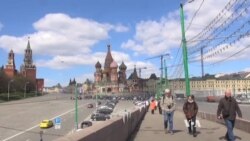MOSCOW —
The head of the European Union's delegation to Russia has cast doubt on the effectiveness of last week's mutiparty agreement to reduce tensions in Ukraine. Vygaudas Usackas spoke to VOA's Russian service about EU-Russia relations as Ukraine called on Russia to explain its military drills near their border.
Usackas says there are no magic solutions to the problems in Ukraine. The Geneva accords are the only mutually agreed upon platform for resolution, he says, but they may not be working.
“Unfortunately, in the eastern part of Ukraine, we have seen little if at all progress with respect to implementation [of the] Geneva accords especially when it comes to the disarmament of illegally armed groups," said Usackas.
Usackas called on Russia to “step up” its efforts to ease the tension. In eastern Ukraine Thursday fighting between Ukrainian security forces and pro-Russia activists killed at least five militants. Russian President Vladimir Putin called it a "crime" and threatened what he described as “consequences.”
Usackas had this to say about the Ukrainian government’s “anti-terrorist” operations.
“We respect the right of the Ukrainian government to defend its sovereignty and territorial integrity, but, at the same time, we call upon all parties concerned, including the Ukrainian government, to avoid provocative actions," he said.
As Usackas urged peace, Russian forces stationed just over the Ukrainian border began military exercises in response to the Kyiv government's operations. Usackas said more sanctions could be in the future for Russia.
“Work is being done by the [European] commission in preparing a possible third stage of sanctions which may involve an economic nature," said Usackas.
He says sanctions could intensify if the Geneva accords fall through. Those sanctions would likely involve more travel bans and asset freezes - not oil and gas embargoes.
“Both parties are very realistic that, for the foreseeable future, [they] will remain mutually interdependent. In terms of energy cooperation, Russia needs cash and we need Russian gas,' he said.
Meanwhile, the Interfax news agency reported that Russia’s Gazprom has issued its Ukrainian counterpart Naftogaz a bill of $11.4 billion for a purchase shortfall.
Usackas says that in the modern globalized world market, the EU must think carefully about what he called its “ultimate purpose” in dealing with Russia.
“The Russian Federation is different than what we expected, and we have to acknowledge that and deal with the realities," he said.
For now, those realities are uncertain as diplomacy strives to keep the war of words from transferring to the battlefield.
Usackas says there are no magic solutions to the problems in Ukraine. The Geneva accords are the only mutually agreed upon platform for resolution, he says, but they may not be working.
“Unfortunately, in the eastern part of Ukraine, we have seen little if at all progress with respect to implementation [of the] Geneva accords especially when it comes to the disarmament of illegally armed groups," said Usackas.
Usackas called on Russia to “step up” its efforts to ease the tension. In eastern Ukraine Thursday fighting between Ukrainian security forces and pro-Russia activists killed at least five militants. Russian President Vladimir Putin called it a "crime" and threatened what he described as “consequences.”
Usackas had this to say about the Ukrainian government’s “anti-terrorist” operations.
“We respect the right of the Ukrainian government to defend its sovereignty and territorial integrity, but, at the same time, we call upon all parties concerned, including the Ukrainian government, to avoid provocative actions," he said.
As Usackas urged peace, Russian forces stationed just over the Ukrainian border began military exercises in response to the Kyiv government's operations. Usackas said more sanctions could be in the future for Russia.
“Work is being done by the [European] commission in preparing a possible third stage of sanctions which may involve an economic nature," said Usackas.
He says sanctions could intensify if the Geneva accords fall through. Those sanctions would likely involve more travel bans and asset freezes - not oil and gas embargoes.
“Both parties are very realistic that, for the foreseeable future, [they] will remain mutually interdependent. In terms of energy cooperation, Russia needs cash and we need Russian gas,' he said.
Meanwhile, the Interfax news agency reported that Russia’s Gazprom has issued its Ukrainian counterpart Naftogaz a bill of $11.4 billion for a purchase shortfall.
Usackas says that in the modern globalized world market, the EU must think carefully about what he called its “ultimate purpose” in dealing with Russia.
“The Russian Federation is different than what we expected, and we have to acknowledge that and deal with the realities," he said.
For now, those realities are uncertain as diplomacy strives to keep the war of words from transferring to the battlefield.





